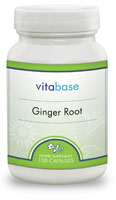| |
Ginger |
|
| Ginger belongs to the family of tropical and subtropical perennial herbs, chiefly of Indomalaysia. Ginger has the botanical name Zingiber officinale and is part of the Zingiberaceae family of plants. The Ginger family consists of at least forty-seven genera and 1,400 species of tropical herbaceous perennials with starchy fleshy rhizomes. Ginger is a knotted, thick, beige underground stem (rhizome). The rhizome is gathered when the leaves have dried and after washing and removing the stem and root fibres it is left out in the sun to dry. Ginger root is a tender creeping perennial from the tropics that grows to about four feet high, producing thick, aromatic, fibrous, knotty, buff-coloured tuberous rhizomes. The stem extends roughly 12 inches above ground with long, narrow, ribbed, and green leaves. Above ground are long stems with narrow, ribbed, green leaves and white or yellowish-green flowers. Ginger root has a long history of culinary and medicinal use in China, Japan, and India. |
| |
Active constituents of ginger |
|
| Ginger's medicinal components are derived from the rhizome or root. They include volatile oils (gingerol, shogoal, zingiberene, and zingiberol), lipids (glycerides, phosphatidic acid, lecithins, and fatty acids), starch, protein, protease, capsaicin, sesquiterpenes (eg zingiberol, zingiberenol), vitamins A and B3 (niacin). The important active components of the ginger root are thought to be volatile oils and pungent phenol compounds (such as gingerols and shogaols). They inhibit prostaglandin and leukotriene formations and give ginger its pungent aroma. Gingerol and shogaol are also responsible for the analgesic, antiemetic, antipyretic, antitussive, antiulcer, hypotensive and cardiodepressant, mutagenic, prostaglandin suppression, and enteromobility enhancing activities of ginger. |
| |
Medicinal uses and health benefits of ginger |
|
| Ginger has been used for centuries in Chinese medicine as a remedy for vomiting, coughing, fever, abdominal bloating, diarrhea,
and rheumatism. Ginger inhibits inflammation, breaks down protein, stimulates liver function, and is a tonic for the heart. Ginger is anti-microbial and an anti-oxidant, and is helpful for hot flashes, indigestion, bowel problems, morning sickness and wounds. Ginger helps in the conversion of cholesterol into bile acids, and can thin the blood. Ginger is an excellent herb to use for strengthening and healing the respiratory system, and for fighting off colds and flu.
Ginger root is an effective treatment for nausea caused by motion sickness, morning sickness or other illness. Ginger may decrease the severity of nausea and the length of time that patients feel nauseated after receiving chemotherapy, surgical anesthesia, or nausea caused by other medications. Gingerols and shogaols in ginger help to neutralize stomach acids, enhance the secretion of digestive juices, and tone the muscles of the digestive tract. Ginger has been taken by pregnant women to alleviate the nausea and vomiting of pregnancy. Ginger stimulates the liver and gall bladder into better performance and to aid in digestion. Ginger's anti-inflammatory abilities also help reduce hip and knee pain in some osteoarthritis patients.
Ginger lowers cholesterol levels by impairing cholesterol absorption, helping it convert to bile acids and then increasing bile elimination. Ginger's anti-nausea action also helps dispel dizziness, particularly when the dizziness is aggravated by motion sickness. Ginger helps indirectly to relieve chronic pain by reducing inflammation by lowering the body's level of natural pain-causing compounds called prostaglandins. Ginger is also used as an anti-inflammatory against rheumatic pain and arthritis. Ginger may boost the pumping action of the heart, prevent the formation of clots, reduce cholesterol levels, and fight inflammation. Coughs can be relieved by drinking ginger tea made from dried or powdered ginger.
|
| |
Dosage and administration of ginger |
|
| Ginger is used in teas, ginger ale, ginger beer, capsules, broths, and as a spice. The usual daily ginger intake is 2 to 4g per day. For prevention or treatment of motion sickness, take 500 – 1000 mg of dried ginger powder before travel. For the treatment of nausea associated with pregnancy, women can take up to 1 gram daily. To relieve arthritis pain, take fresh ginger juice, extract, or tea, 2 to 4 grams daily. To prevent vomiting, take 0.5 to 2 grams daily. |
| |
Side effects, precautions, interactions |
|
| Ginger is a safe herb with a wide dosage range. Side effects associated with ginger are rare, but if taken in excessive doses the herb may cause mild heartburn. Large doses of ginger may cause cardiac effects, depression of the central nervous system and heartburn. Ginger can also interfere with absorption of tetracycline, digoxin, sulfa drugs, and phenothiazines. Ginger's components may interfere with normal blood clotting. High doses (6 grams or more) may damage the stomach lining and could eventually lead to ulcers. Patients with gallstones or an allergy to ginger shouldn't take ginger. |
|
|
|
|
 The anti-inflammatory properties of ginger have been shown to reduce hip and knee pain in some osteoarthritis patients. For many years, ginger has been suggested as an aid to relieve or prevent nausea and vomiting related to pregnancy. Ginger has also demonstrated some effectiveness in lowering cholesterol levels. Click here for more information.
The anti-inflammatory properties of ginger have been shown to reduce hip and knee pain in some osteoarthritis patients. For many years, ginger has been suggested as an aid to relieve or prevent nausea and vomiting related to pregnancy. Ginger has also demonstrated some effectiveness in lowering cholesterol levels. Click here for more information.